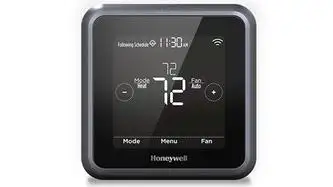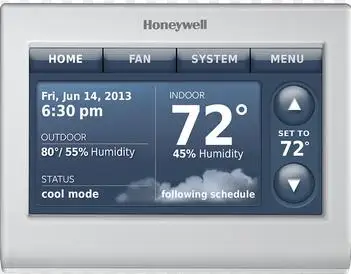Why is My Honeywell Thermostat on Cool But Not Working?
Honeywell Thermostats: A New Way to Save Energy and Money: To avoid an overdrive to the energy grid, utility companies put a variety of voluntary energy saving programs (recognised in the industry as demand response, or DR) into operation; these procedures motivate consumers to decrease their energy use during times of peak demand.
In the past, utility companies would set up a wireless device in the property holder's air conditioning compressor that would switch it off if the company was facing peak demand; this action would often infuriate homeowners who would often feel abandoned and helpless.
At present, however, consumers sign up online by linking their smart Honeywell thermostat with their utility account. Using a consumer’s utility account, the utility firm despatches an alert via an app or on the thermostat when there is a greater than before demand; after this, the utility company will tweak a homeowner’s thermostat to reduce the stress on the system.

Honeywell Wi-fi thermostats have smart wireless sensors that evaluate temperature and dampness and let residents rank which rooms receive how much heat and at what time of the day. As soon as they are installed, the thermostat starts working, fine-tuning temperatures based on the occupant/s in the home and the current state of affairs on the city-wide power grid.
Owner-occupier families, using Honeywell thermostats save on energy costs while reducing the stress on energy systems during peak hours; this, in turn, prevents utility companies from building high-priced infrastructure.
Why is My Honeywell Thermostat on Cool But not Working?
In case you have put your name down for a saver switch through your utility company, they may be briefly excluding you during peak demand hours. However, if you are sure that it does not apply to you and your Honeywell thermostat is on cool but not working, then carry out the following steps:
Step 1 : Double-check that the thermostat is switched to cool mode and has a cooling point that is less than the room temperature reading.
Step 2 : Examine the thermostat display to substantiate the need for cooling; it is generally shown by the words "cool on" or a snowflake icon.
Step 3 : Flashing "cool on" or snowflake icon means that the thermostat is in delay mode, which can use up roughly five minutes. This postponement safeguards your equipment from short cycling.
Step 4 : If the thermostat signals a call for cool, then make sure that the furnace door is firmly closed and that the power knob on the furnace is on.
Step 5 : Confirm that the circuit breaker switches for the furnace are on.
If there is no cooling despite these steps, get in touch with a professional HVAC contractor.
On Condition That it is a Recent Installation:

- Confirm that the wiring was coordinated in the approved manner when shifting from the old Honeywell thermostat to the new Honeywell thermostat.
- In case R and Rc do not have separate wires, then these terminals must be linked.
- In a few Honeywell thermostats, a jumper wire connection fits them together whereas, in other models, a slider switch with 1-wire and 2-wire settings join them.
- The installation guide of your Honeywell thermostat will indicate the type of connection you have.
- Make sure that the Honeywell thermostat has been accurately designed for your system.
Priority Control in the Latest Smart Honeywell Thermostats:
A family's comfort requirements will not be the same in every room at different times of the day. And the temperature in each room should provide a feeling of ease to the family as they shift from one place to another in their home.
Though this concept of detecting different temperatures around a home is not brand new, the awareness of priority control is new.
For instance, when you're asleep, you prefer a cooler bedroom, but when you are up and about, you expect a slightly warmer temperature in the living room. And when on holiday, you would want to change the temperature so that you save energy.
With smart Honeywell thermostats, consumers fine-tune temperature control in the rooms they desire and when they feel like.
 Published by: Blaze
Published by: Blaze Brand: Honeywell Doorbell
Brand: Honeywell Doorbell Last Update: 2 months ago
Last Update: 2 months ago
 Related Blogs
Related Blogs
How to Install Honeywell Wireless Alarm?
How to Set Honeywell Thermostat Temperature?
Why is my Honeywell Thermostat Show up as Offline?
How to Reset Honeywell Thermostat WiFi?
Why is My Honeywell Thermostat not Working?

Trending Searches
-
How To Setup WiFi On Samsung Refrigerators? 31 Oct, 25
-
How to Fix Hikvision Error Code 153? - 2026 01 Oct, 25
-
Fix Shark Robot Vacuum Error 9 Easily (How) 26 Nov, 25
-
How to Set up Arlo Camera? 08 Jun, 25
-
How to Watch StreamEast on FireStick? 12 Nov, 25

Recent Post
-
How to Install Kodi on Amazon Fire Stick? 08 Dec, 25
-
How to Connect Govee Lights to Alexa? 08 Dec, 25
-
How to Connect Kasa Camera to WiFi? 07 Dec, 25
-
How to Fix Eero Blinking White Problem? 07 Dec, 25
-
How to Reset Eero? 07 Dec, 25
-
Why is My ADT Camera Not Working? 06 Dec, 25
-
Merkury Camera Wont Reset? Fix it 06 Dec, 25
-
How to Connect Blink Camera to Wifi? 06 Dec, 25
Top Searches in honeywell doorbell